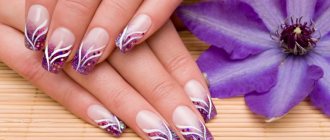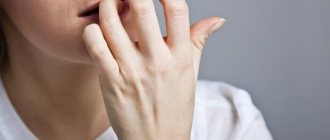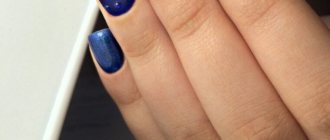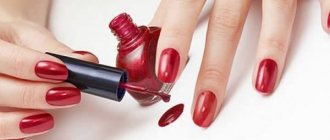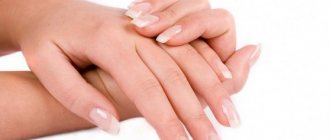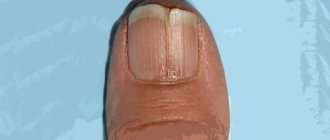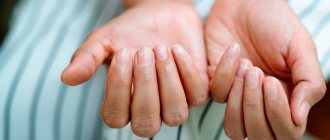Many are haunted by harmful, unaesthetic habits that are difficult to give up. Have you often heard the phrase “stop biting your nails” from your friends, but have not paid enough attention to it? Perhaps you are simply unaware of all the danger that lurks beneath them? Along with the fact that this is bad manners and does not look very nice, you should not bite your nails also because it will negatively affect the body from a medical point of view. Let's figure out why you should give up an unhygienic habit, and how to do it without psychological discomfort.
photo from the site yaostrov.ru
Complications
Complications associated with the habit of biting nails:
- Sometimes children may bite their nails so deeply that they often bleed, which can damage their fingers or cause gum inflammation.
- Biting your nails with dirty hands can lead to infections and illnesses
- Severe nail biting could be a sign of anxiety problems that need to be addressed.
- Understanding why your child continues to bite their nails is half the solution to the problem.
Why do people bite their nails? Sometimes this habit appears at a later age. Then a psychologist can come to the rescue. This disease is called onychophagia.
Why is biting your nails dangerous?
The function of the nail as a part of the body is to protect the nerve endings in the fingers from damage, but they are structured in such a way that when the nails grow, dirt accumulates underneath them. She poses a great danger. Research confirms that 80% of infections that enter the body enter through the hands. Even now, as you read, there are about 300 types of bacteria living on your hands, and most are under your nails.
Dermatologists consider the tip of the nail to be the main site of accumulation of bacteria and germs. This happens because we touch objects without knowing whether they are dirty or clean, using our hands. The risk group that can become infected this way are mainly women with long nails, because more bacteria can take root there. There is nothing to worry about as long as the tip of the nails does not come into contact with the mucous membranes: mouth, nose, eyes or ears.

photo from www.youtube.com
If you have coated your nails with varnish, but cannot cope with the bad habit, remember that the harm will be twice as great. Almost all varnishes contain formaldehyde. It is toxic and negatively affects the respiratory system, skin and nervous system. When you bite your nails, formaldehyde enters your body along with the polish.
Health implications
Even just washed hands conceal a lot of infectious agents and their metabolic products – toxins – under the nails. What happens if you bite your nails:
- This is not visible visually, but germs and bacteria often remain under the nails. Researchers have found that salmonella bacteria often remain under the nails and enter through the mouth. As a result, salmonellosis can disrupt the functioning of the gastrointestinal tract. In severe form, it has symptoms similar to typhus and fever. Symptoms of such a disease will be: high body temperature, chills, headache, stomach pain, vomiting, nausea and diarrhea.
- There is a high risk of contracting a fungus if you cut your skin while biting your nails. First, the nail plate weakens and small cracks begin to appear on it. Then the nail thickens and yellow spots appear, which have a characteristic odor. The skin around the nail can become inflamed, sometimes suppuration forms, which cannot be eliminated without the help of doctors.
- The papilloma virus takes root well under the nails, and when it enters the oral cavity, it affects the surface of the gums and teeth. This is a serious disease that initially appears on the skin in the form of a wart. Over time, it can turn into a malignant tumor. Once in the mouth, papilloma can form on the tongue, throat, larynx, lip or gum.
- Worm eggs often live under the nail plates. You petted a sick yard dog and immediately forgot about it, but the pathogen will remain under your nails, and if you start biting them, the consequences will quickly remind you of themselves. It is very easy to become infected with worms while doing ordinary household chores: replanting flowers or washing surfaces.
- Enterotoxins, which can remain under the nails after working in the kitchen with raw meat or vegetables, cause food poisoning when they enter the intestines.
- Diseases of dirty hands, such as dysentery, hepatitis A and E, can put you in a hospital bed for a long time. Yes, and common respiratory infections can also be transmitted through hands.
The most harmless thing that happens when you bite your nails is shown in the photo:
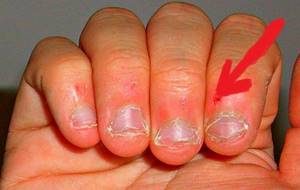
photo from www.youtube.com
Consequences for the nail plate
If a person bites his nails constantly, there is a high probability of damage to the nail plate. This often happens in children: starting from the age of four, they actively bite their nails. When a person bites his nails frequently, the plate becomes deformed and loses its attractive appearance.
What happens if you bite your fingernails:
- A series of grooves appear on the nail plate, located longitudinally or transversely and resembling waves.
- The nail becomes concave, spoon-shaped.
- The shape of the nail becomes unnatural, and the nail itself becomes too large. This occurs due to the fact that the nail folds are raised and the nail plate becomes denser.
- The nail may peel off, lose strength and crumble. There is a high probability that spots will appear on the nail plate.

photo from livesbloggz.com
The habit of biting your nails greatly harms your teeth. It allows infection into the oral cavity, which leads to inflammation of the gums and stomatitis, forming ulcers in the oral cavity and creating unpleasant sensations when eating. Biting your nails wears away your tooth enamel and also loosens your teeth.
You should not treat this habit thoughtlessly or pay insufficient attention to it, because the consequences will manifest themselves, and you will understand, but by your own example, what happens if you bite your nails.
In some cases, the habit of biting nails indicates an obsessive-compulsive mental disorder. This disorder is characterized by obsessive thoughts that haunt a person and lead to repetitive behavior. Through them, he tries to reduce anxiety. In other words, through the fact that a person constantly bites his nails, he suppresses stress. Having discovered obsessive-compulsive disorder, it is quite difficult to cope with it on your own without the help of a psychologist.
Of course, we shouldn’t forget about how this habit looks to the people nearby. The photo shows what happens if you bite your nails. At such moments you look unattractive, and your nails always leave a negative review about you, showing that you are sloppy. Even if you always make sure that no one sees the process itself, the consequences will be revealed at an interview, meeting with business partners or a romantic date.

photo from the site https://gorod.khudzhand.mnogonado.tj
The fact that you bite your nails and the skin around them leads to the appearance of hangnails, which are then difficult to get rid of. Hangnails allow unwanted infections to enter the body through small wounds. To have a concrete idea of why you should not bite your nails, watch the video at the end of the article.
Adviсe
Tools, Tips, and Tactics to Stop Nail Biting
- Replace nail biting with a good habit or fun activity: teach your child to play with a stress ball, fidgeting hand, or silly putty instead. This will help keep his hands busy and away from his mouth. Gnawed nails - nails that are chewed photo:
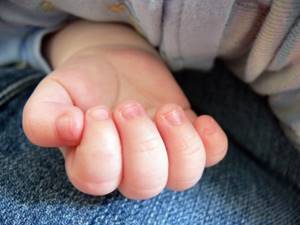
- The following are methods and products to stop nail biting, but they must be respectful of others around the child. For example, children with sensory issues will never be comfortable sitting next to a child chewing gum.
So, the child bites his nails. The psychologist’s advice is as follows:
- After weighing the pros and cons and keeping the needs of others in mind, below are some tools, tips and tactics you can use to prevent nail biting:
- Using a bitter-tasting product applied to the nails: nail polish, lotions, perfumes, or homemade potions made from pepper or soap.
- Apply a bitter substance such as ginger oil, which is easily obtained by soaking ginger for two weeks in olive oil.
- Place the patches on your nails.
- Engage with your child and focus on fun activities.
- Reinforce positive behavior by praising it.
- Place a rubber band around his wrist and grab it whenever he has the urge to bite his nails.
- Can create a reward system to motivate the child for every small step.
Why do people bite their nails?
This habit has been with us for a long time - for example, it was definitely noticed in Ancient Greece: in the biography of the early Stoic philosopher Cleanthes it is mentioned that he bit his nails - which means there was something remarkable about it. In the 20th century, under the influence of the ideas of Sigmund Freud, nail biting was often explained by “oral fixation” and problems were traced to the relationship with the mother in the first months of life. There was even a small study that found confirmation of this hypothesis. But later other theories appeared.
Genetics.
Scientists are not 100% sure about this, but there are observations: children whose parents bite their nails are likely to do it too, even if by the time the child is born the parents no longer have this habit. Researchers have even found benefits to a behavior that is usually frowned upon: Children who bite their nails are less likely to have allergic reactions, apparently because they are constantly receiving microdoses of pathogens and allergens from their hands and nails.
Behavioral disorders.
The medical reference lists pathological nail biting as a “body-focused cyclic disorder”: such patients may also bite their lips or chew their cheeks. “Cyclical actions are not caused by obsessions or preoccupations with appearance, but they may be preceded by feelings of tension or anxiety, which these actions usually relieve, which in turn are often followed by a feeling of satisfaction.”
Regulation of emotions.
There is a more positive theory about nail biting: it can provide the biter with temporary distraction, relaxation and a little pleasure. In a study conducted by Sarah Roberts and other researchers at the University of Quebec at Montreal, people with onychophagia, trichotillomania (hair pulling), or other body-focused repetitive behavior were placed in situations designed to cause frustration (they were given a difficult task which could not be completed in the allotted time), boredom (they were left in a room with absolutely nothing to do for a while), anxiety (they watched a plane crash scene from a feature film) or relaxation (they watched a video of the beach while sitting in a comfortable chair). Obviously, these situations are somewhat artificial. However, when the researchers observed the behavior of the participants - and subsequently asked them how strong their desire to do something with their skin or nails was - they found that people experienced stronger urges when they were stressed and bored than when they were relaxed. Other studies of nail-biters and hair-pullers have reached similar conclusions: Nail-biting is involved in emotional regulation.
Perfectionism.
This personality trait also increases the likelihood of developing a nail-biting habit: perhaps tearing off an “irregularly” shaped nail gives the biter the satisfaction of correcting the imperfection—and the search for this satisfaction eventually spins out of control.
The simplest option.
There is also a more down-to-earth explanation - without genetics and “oral fixation”. Perhaps we bite our nails simply because we have them. Psychologists remind us that psychologically (not chemically) you can become dependent on almost anything: any activity that brings at least minimal reward can become fixed over time. Hands are always available. Biting off a piece of your nail can give you a little pleasure. Then - again. And further. The habit has developed.
Consequences of a bad habit
It is no coincidence that onychophagia is called a bad habit. It really does lead to negative consequences, including impacts on health.
- Deformation of the nail plate is inevitable - it becomes loose, covered with cracks, grooves, and begins to delaminate. The longer a person bites his nails, the more they become deformed.
- At the same time the cuticle , which performs a protective function, is damaged.
The extension procedure can solve these problems, but will require financial costs. In addition, most men do not use such a service. - Microbes. Dirt containing various bacteria also accumulates under the nails. When a person bites them, harmful microorganisms easily enter the body. This way you can become infected with worms or an intestinal infection. Bacteria also seep through microscopic wounds in the skin around the nail, which can cause serious inflammation.
This video talks about the unpleasant consequences of onychophagia.
The terrible consequences of nail biting
Onychophagia is a bad habit that affects not only the appearance of your hands, but also causes significant harm to your health. Think about the ulcers that appear on the inside of your cheeks at the most inopportune moments and interfere with the joy of kissing. Long conversations become torture. By biting your skin and depriving your body of natural defenses, you open the way for bacteria and viruses.
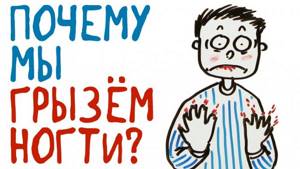
Why do we bite our nails?
Just imagine how much dirt accumulates on your hands throughout the day. You introduce hundreds of microorganisms into the oral cavity that damage your gums and soft tissues. Sharp nails compete in hardness with teeth, obviously not in favor of the latter, they damage the enamel and increase the risk of caries. And swallowed pieces of skin and nails irritate the gastric mucosa and increase the likelihood of developing gastritis. Well, is it disgusting enough?
Substitution method

Nails that are bitten, as in the photo, can be grown back using the replacement method. Its essence is to replace one negative habit with another, less negative, or even useful one. A classic example is when, instead of biting your nails, you eat something you like. However, using this method, it is enough to simply replace nail biting with overeating, which is also extremely unpleasant.
You can try replacing a negative habit with a positive one. Try to find an activity that gives you pleasure, but does not harm your body or others. Every time you try to bite off a nail, proceed to perform this action.
Recommendations from psychologists
Psychologists strongly recommend that parents whose children bite their nails pay attention to themselves and the psychological situation in the family. It is necessary to eliminate all factors that provoke the bad habit. They will also help distract your child:
Finger exercises are a great way to develop a child’s speech.

Drawing helps develop imagination. You can draw from 10 months. For little ones, you can buy special finger paints that promote the development of fine motor skills.

Special ointments and varnishes that can be bought at the pharmacy.
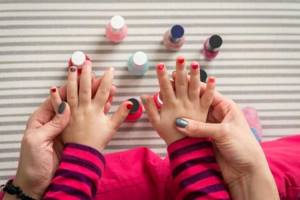
Girls of school age can get a manicure. Usually, after this, they do not want to spoil the appearance of their nails and bite them.
It is impossible to determine exactly what helps stop a child from biting his nails. Here parents should be patient and try different methods. If one doesn't fit, then another might.

The most important thing is not to scold or scold the child. In the fight against onychogaphy, he should feel like your partner, regardless of age.

Causes of bad habit
There is a scientific name for nail biting - onychophagy . Experts say that this habit appears due to neurosis. With severe anxiety, a person subconsciously tries to replace internal tension with something. Some people start biting their nails. This helps to dissipate negative energy and accumulated aggression. As a result, a person manages to be distracted, slightly relax and even calm down.
If we consider onychophagia in detail, we can identify several narrower causes of this problem. Among them, various experts highlight the following:
Reaction to stress
According to one of the popular theories of psychology, nail biting becomes a response to the influence of a stressful situation. This action allows some people to relax, others to calm down, and others to improve their brain activity.

In France, sociologists conducted an interesting experiment. They surveyed local residents, asking them just one question: “In what situations do you start biting your nails?”
The results of the study showed that most French people develop bad habits at work . 26.5% of respondents bite their nails when they think about the tasks set by management or worry about their career, salary, or position.
Slightly fewer respondents said that they often bite their nails while shopping . According to scientists, the reason for the emergence of a bad habit in this case is the agony of choice. Among the remaining responses of respondents, one can highlight thinking about the economic situation in the country, as well as worries about children and parents .
Suppressed desires
One of the theories in neo-Freudianism states that nail biting is nothing more than an analogue of masturbation, only more acceptable in society. For this reason, the bad habit has probably become widespread.
"Inheritance" from parents
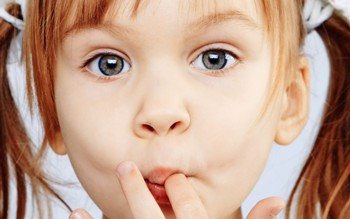
There is a widespread belief among people that the habit of biting nails is a hereditary pathology. Allegedly, it is always passed on from parents to children, and nothing can be done about it.
However, genes have nothing to do with it. In reality, every child copies the behavior of adults and adopts their habits. However, it is extremely difficult to eradicate what was ingrained in childhood. So it turns out that people whose parents bite their nails begin to do the same, maintaining this habit into adulthood.
Dissatisfaction with oneself

Someone may say that, although he bites his nails, he does not blame himself for anything. However, the authors of the theory clarify that in this case we are talking about the suppression of feelings. All dissatisfaction with oneself is usually hidden at the subconscious level.
Obsessive-compulsive disorders
In some cases, nail biting is a symptom of obsessive-compulsive disorder. Patients with this disease are haunted by obsessive thoughts . To cope with their anxiety, such people come up with certain rituals that are repeated day after day. Some wash their hands endlessly, others constantly count some items. There are also patients who bite their nails.
Fragility of the nail plate
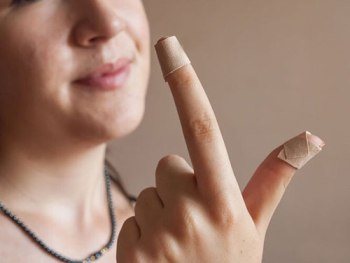
In most cases, a bad habit in adults appears precisely due to psychological reasons. However, sometimes its occurrence is associated with physiology.
Many people's nail plates become thinner with age. If a nail breaks in a public place where scissors and files are not available, some people decide to replace them with their teeth. Then the person regrets that he gave himself such a manicure, but it is already too late.

